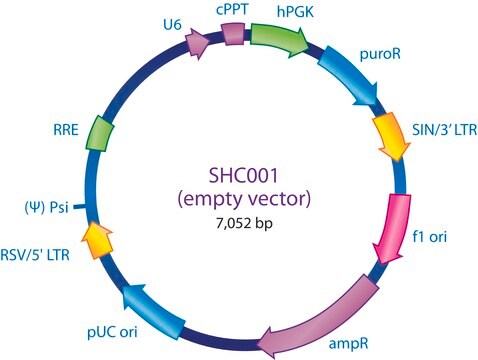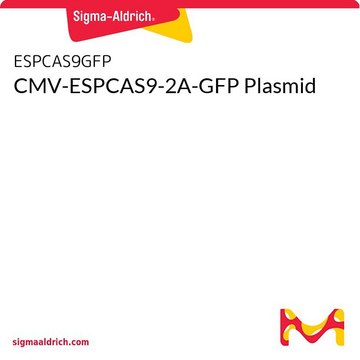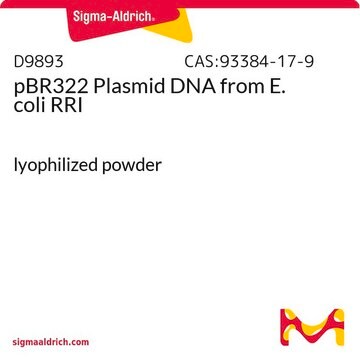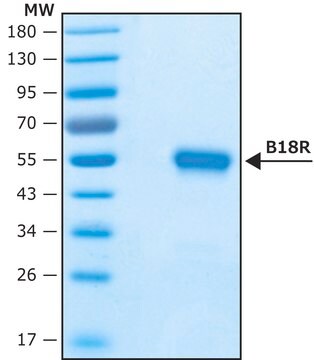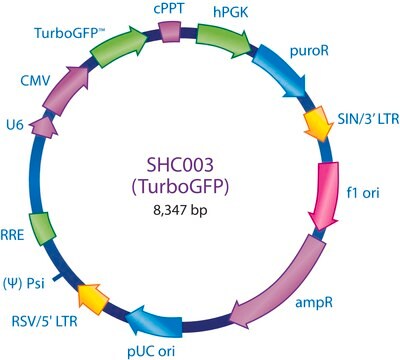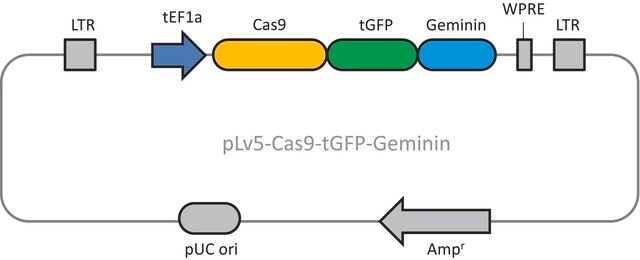SCR725
TagGFP2 Simplicon® Plasmid (E3L)
To determine optimal transfection conditions to express the self-replicating RNA of your interest through using Simplicon Cloning Vector (E3L) (Part #:SCR724) in hard-to- transfect somatic or primary cells
Sign Into View Organizational & Contract Pricing
All Photos(1)
About This Item
UNSPSC Code:
12352207
eCl@ss:
32161000
NACRES:
NA.81
Recommended Products
technique(s)
nucleic acid detection: suitable (RNA)
shipped in
ambient
General description
Simplicon is a novel system to effect immediate high sustained protein expression of multiple genes into transfected cells without the risk of genome integration. The technology employs a single, synthetic, polycistronic, self-replicating RNA based on the Venezuelan equine encephalitis (VEE) genome1,2,3,4. The Simplicon RNA contains only genes encoding the VEE RNA replication machinery while the structural proteins that are required to make an infectious particle have been removed and replaced with the transgenes of interest. The Simplicon RNA is a synthetic RNA generated from the SimpliconTM Cloning Vector (E3L) plasmid.
Introduction and replication of the Simplicon RNA is expected to elicit a strong interferon response in transfected cells. To suppress the IFN responses, a Vaccinia virus protein5, B18R, is used for the original SimpliconTM technology. Recently, we found that another Vaccinia virus protein5, E3L, also suppresses the IFN responses in Simplicon RNA expression. B18R neutralizes type I interferons by direct binding, while E3L inhibits the cytoplasmic signaling pathways of IFN responses. Therefore, B18R and E3L are both employed in the Simplicon Expression System and work collaboratively to suppress IFN responses. As a result, there is increased cell viability during RNA transfection and increased expression of the transgenes. The Simplicon Expression System works in human cells and is not expected to work in mouse cells. This is because the B18R does not effectively neutralize mouse interferon (IFN)-β.
One day after transfection of the Simplicon RNA, a spike in the levels of transgenes can be observed. The expression levels are maintained by addition of B18R, E3L and the selective agent, puromycin throughout the duration of the experiment. Over time, expression levels are expected to diminish and stabilize to 1/5 – 1/10 the levels initially observed and may be close to physiological levels after one week. Expression levels and duration may change depending upon the cell types, transgenes and media conditions used. The Simplicon technology has been successfully utilized for efficient human iPSC generation through the sustained expression of critical reprogramming factors3,4 and in the creation of cell lines that express and retain the metabolic activities of five cytochrome P450 enzymes6.
In the Simplicon Expression System, B18R and E3L are provided as a B18R-E3L RNA (Cat. No. SCR722) for the suppression of IFN responses at RNA transfection. For sustained transgene expression, recombinant B18R protein (Cat. No. SCR156 and SCR197) or B18R conditioned medium (B18R-CM) can be used. E3L is continuously provided from the Simplicon RNA itself. B18R-CM can be produced from B18R-E3L RNA or B18R RNA synthesized using the B18R-E3L plasmid (Cat. No. SCR727) or B18R plasmid (Cat. No. SCR728), respectively.
The TagGFP2 Simplicon Plasmid (E3L) was developed for the synthesis of TagGFP2 Simplicon RNA (E3L). The Simplicon TagGFP2 RNA may be used to determine optimal transfection conditions to express the self-replicating RNA in hard-to transfect somatic or primary cells. Simplicon TagGFP2 expresses an improved variant of the Aequorea macrodactyla GFP-like protein. TagGFP2 exhibits bright green fluorescence comparable to that of EGFP, with excitation/emission maxima at 483 and 506 nm, respectively7,8.
Introduction and replication of the Simplicon RNA is expected to elicit a strong interferon response in transfected cells. To suppress the IFN responses, a Vaccinia virus protein5, B18R, is used for the original SimpliconTM technology. Recently, we found that another Vaccinia virus protein5, E3L, also suppresses the IFN responses in Simplicon RNA expression. B18R neutralizes type I interferons by direct binding, while E3L inhibits the cytoplasmic signaling pathways of IFN responses. Therefore, B18R and E3L are both employed in the Simplicon Expression System and work collaboratively to suppress IFN responses. As a result, there is increased cell viability during RNA transfection and increased expression of the transgenes. The Simplicon Expression System works in human cells and is not expected to work in mouse cells. This is because the B18R does not effectively neutralize mouse interferon (IFN)-β.
One day after transfection of the Simplicon RNA, a spike in the levels of transgenes can be observed. The expression levels are maintained by addition of B18R, E3L and the selective agent, puromycin throughout the duration of the experiment. Over time, expression levels are expected to diminish and stabilize to 1/5 – 1/10 the levels initially observed and may be close to physiological levels after one week. Expression levels and duration may change depending upon the cell types, transgenes and media conditions used. The Simplicon technology has been successfully utilized for efficient human iPSC generation through the sustained expression of critical reprogramming factors3,4 and in the creation of cell lines that express and retain the metabolic activities of five cytochrome P450 enzymes6.
In the Simplicon Expression System, B18R and E3L are provided as a B18R-E3L RNA (Cat. No. SCR722) for the suppression of IFN responses at RNA transfection. For sustained transgene expression, recombinant B18R protein (Cat. No. SCR156 and SCR197) or B18R conditioned medium (B18R-CM) can be used. E3L is continuously provided from the Simplicon RNA itself. B18R-CM can be produced from B18R-E3L RNA or B18R RNA synthesized using the B18R-E3L plasmid (Cat. No. SCR727) or B18R plasmid (Cat. No. SCR728), respectively.
The TagGFP2 Simplicon Plasmid (E3L) was developed for the synthesis of TagGFP2 Simplicon RNA (E3L). The Simplicon TagGFP2 RNA may be used to determine optimal transfection conditions to express the self-replicating RNA in hard-to transfect somatic or primary cells. Simplicon TagGFP2 expresses an improved variant of the Aequorea macrodactyla GFP-like protein. TagGFP2 exhibits bright green fluorescence comparable to that of EGFP, with excitation/emission maxima at 483 and 506 nm, respectively7,8.
Application
The Simplicon TagGFP2 plasmid (E3L) was developed to enable the evaluation of the Simplicon expression system in your cell line(s). For example, it may be used to determine optimal transfection conditions to express the self-replicating RNA of your interest through using Simplicon Cloning Vector (E3L) (Part #:SCR724) in hard-to- transfect somatic or primary cells.
To determine optimal transfection conditions to express the self-replicating RNA of your interest through using Simplicon Cloning Vector (E3L) (Part #:SCR724) in hard-to- transfect somatic or primary cells
Storage and Stability
TagGFP2 SimpliconTM Plasmid (E3L) (Cat. # SCR725). One (1) vial containing 10 µL of Plasmid (1 µg/µL). Store at -20 °C.
Other Notes
Concentration: Please refer to lot specific datasheet.
Legal Information
SIMPLICON is a registered trademark of Merck KGaA, Darmstadt, Germany
Disclaimer
Unless otherwise stated in our catalog or other company documentation accompanying the product(s), our products are intended for research use only and are not to be used for any other purpose, which includes but is not limited to, unauthorized commercial uses, in vitro diagnostic uses, ex vivo or in vivo therapeutic uses or any type of consumption or application to humans or animals.
Storage Class Code
12 - Non Combustible Liquids
Flash Point(F)
Not applicable
Flash Point(C)
Not applicable
Certificates of Analysis (COA)
Search for Certificates of Analysis (COA) by entering the products Lot/Batch Number. Lot and Batch Numbers can be found on a product’s label following the words ‘Lot’ or ‘Batch’.
Already Own This Product?
Find documentation for the products that you have recently purchased in the Document Library.
Our team of scientists has experience in all areas of research including Life Science, Material Science, Chemical Synthesis, Chromatography, Analytical and many others.
Contact Technical Service

